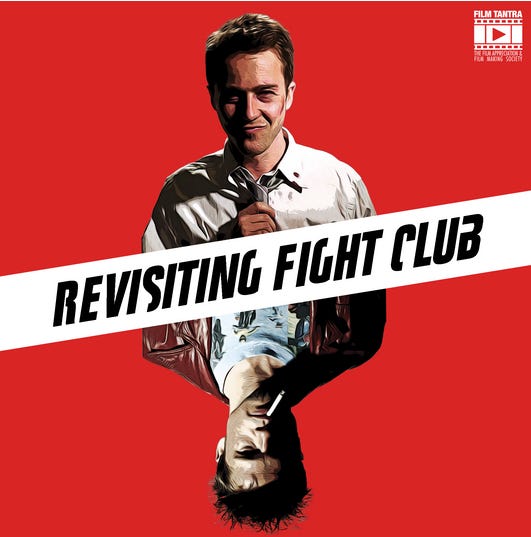Revisiting Fight Club
David Fincher’s Fight Club is one film that somehow makes its way into almost every discussion on masculinity, consumerism, and several other themes owing to its visceral nature. It is one of the most widely interpreted and sometimes misunderstood movies as well. My conversations with other fight club enthusiasts often give the impression that we have been watching two different films Ultimately, the ambiguity demands the viewers' participation and improves the experience. Nonetheless, the fight club remains a unique thought experiment about what disenfranchised men would do if they were liberated of all social constraints and fears. (Spoiler alert: the answer is disturbing).
Fight club revolves around a nameless insomniac who is at first just another cog in the corporate machinery living a repetitive and inauthentic life. He tries to seek solace in the acquisition of material possessions but remains trapped in a wretched existence, apparently building an identity though difficult, is better than trying to purchase one from the marketplace. His namelessness highlights the insignificance of his being. The narrators existential dread really strikes a chord for young disaffected people who feel they’ve done everything they were told to do, but still, feel empty and it’s slowly starting to dawn on them that the rewards they were promised are never going to appear, certainly not in the way they were promised, one of whom was Brad Pitt himself who in an interview with rolling stone in 1999 said “ I’m the guy who’s got everything, But I’m telling you, once you get everything, then you’re just left with yourself. I’ve said it before and I’ll say it again: It doesn’t help you sleep any better, and you don’t wake up any better because of it.”
The narrators growing discontentment with his place in the world is such that he wishes for a crash each time he gets on a plane for one of his dull business trips but only on a plane, he gets acquainted with Tyler Durden, the antagonist who stands in stark contrast to the narrator (apart from their common inclination towards getting beaten to a pulp). With his devil may care attitude, non-conformist and hypermasculine identity, Tyler is everything the narrator could ever wish to be (it’s Brad Pitt, what do you expect). In one of the most iconic scenes in the film he puts forward a scathing critique of consumerism, urging the narrator to stop chasing the lifestyle sold to him by advertisers and realize that as soon as one desire is fulfilled another desire takes its place instead of satisfaction. The belief that perfection is normcore is creating an unhealthy perspective in many people’s minds, disconnected from reality.
Liberated of all worldly desires Tyler lives in a decrepit house, sells soap made out of fat removed from bodies by liposuction, and sometimes even adds pornographic slides to family-oriented movies from the projection room. Later, it is revealed Tyler is an alter ego that exists only in the narrator’s imagination reflecting his ambitions. It is almost prophetic of the online personas people would adopt, completely different from their reality, in the internet age that arrived a few years after the film’s release.
In the film, Tyler and the narrator give birth to an underground fight club, a bare-knuckle bliss filled with devitalized men living mediocre lives and looking to reinstitute their manhood through violence. The cathartic release of aggression has never been articulated with such finesse before, the fight sequences almost blur the line between pain and pleasure. However, the club that initially introduced its members to a dissident mindset and helps find their true selves later descends into a group of homegrown terrorists who want to impose their anarchist principles on the world through violent means, known as project mayhem. It is ironic how men searching for their individuality had now accepted imprisonment under their dictator Tyler through mindless obedience, which even the narrator is appalled by. Fight club portrays an extreme version of how men can fetishize leaders in the absence of a fulfilling existence and turn into mouthpieces for some ideology.
In his journey to bring project mayhem’s activities to an end, the narrator ultimately kills Tyler by shooting himself in the cheek (because apparently, that’s where your alter ego resides), explicitly picking a path between mindless conformity and the absence of societal norms which only led to chaos. The script plays around with Tyler’s madness to such an extent that some viewers might forget that he is supposed to be frightening, in most interpretations his charisma triumphs over the idea that he is wrong. Fincher does his job so well that it is tempting to fall for Tyler’s cult which is why many people found a sort of gospel in his philosophies and believed quite literally that maybe self-destruction is the answer. While exploring the dilapidated condition of the white-collared modern male Fight club actually satirizes the hyper-masculine mentally ill people such as those in project mayhem.
There could be as many interpretations as there are viewers and imposing a definitive one only spoils the fun, but it cannot be disputed that Fight Club is one of the most impactful films in the modern era. Surprisingly, fight club's influence in its time was minimal, it was hardly successful at the box office and faded quickly. The film achieved the status of a classic later by selling millions of DVDs and taking place all over social media. From several parts of America videos of real-life fight clubs sprung up online whose members, unlike me obeyed the rules by refusing to talk about it with the police.
-Written by Akshit Sardana



